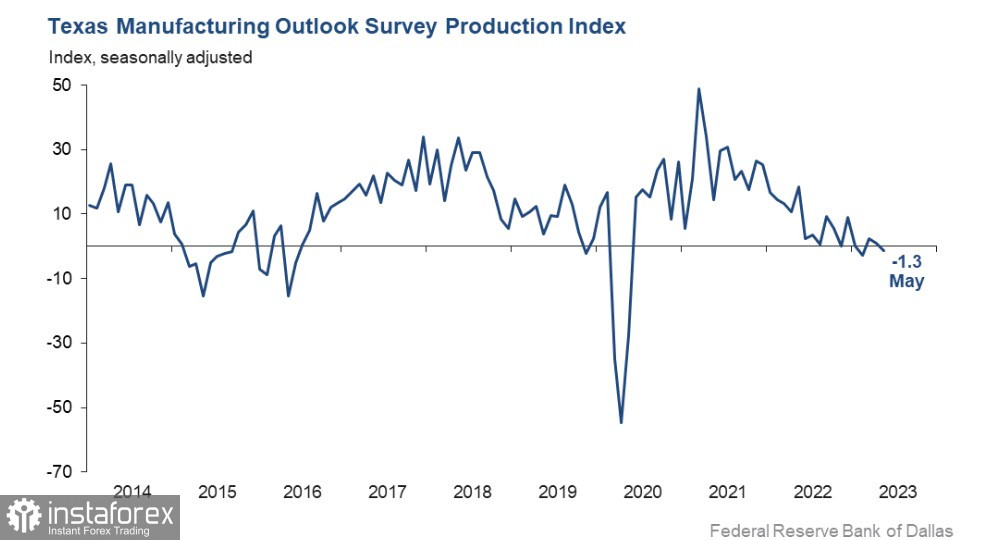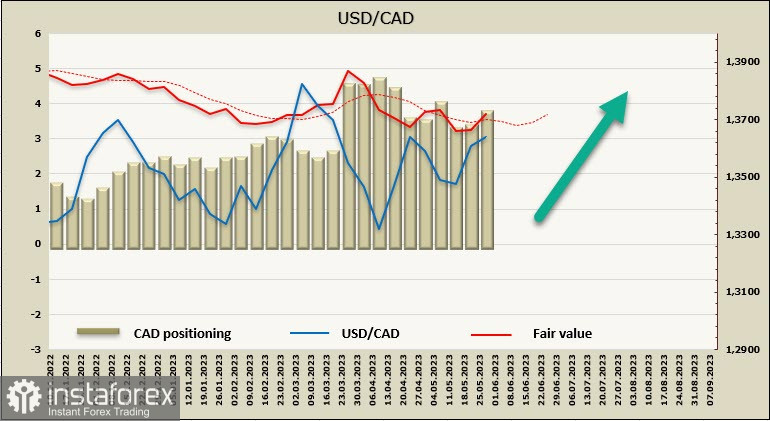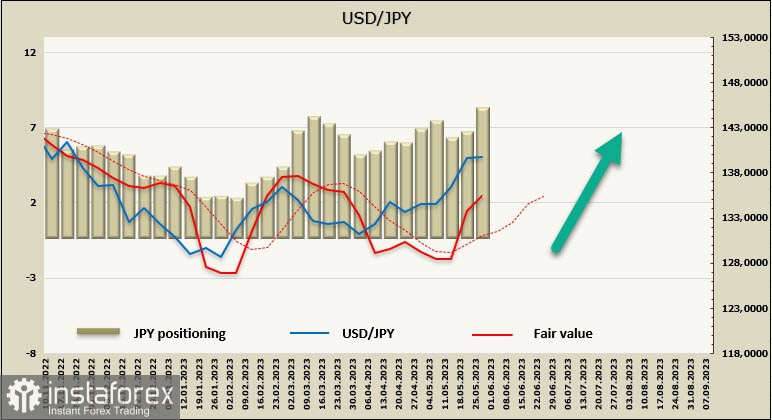The recent US report appears negative. Consumer confidence has dropped to a 6-month low, the Conference Board's index has reached its lowest level since 2011, and the percentage of consumers reporting "plentiful" jobs has fallen to its lowest level in over two years.
The Dallas Fed Manufacturing Activity Index performed worse than expected (-29.1 points versus -23.4 points in April), and the production index declined to -1.3 points, indicating stagnation and aligning with earlier reports from other regional Federal Reserve branches.

There is growing confidence that the Federal Reserve (Fed) will raise interest rates again in June, with rate futures indicating a 63% probability of such a move as of Wednesday morning. These expectations are supporting the dollar.
Oil prices have sharply declined, reflecting two concerns: the possibility that OPEC+ may not provide support for oil prices at their meeting on June 4th, and the overall expectation of reduced oil demand amid signs of an impending global recession.
Asian stock markets fell due to weaker-than-expected PMI data from China. Chinese manufacturing PMI dropped to 48.8 against a forecast of 49.5, the lowest reading since December 2022. Non-manufacturing PMI also fell more than expected, indicating a slowdown in Chinese demand and triggering a rise in demand for safe-haven assets.
USD/CAD
The Canadian dollar continues to trade within a relatively narrow range, lacking a strong catalyst for sustained movement in either direction.
The labor market recovery in Canada has occurred much faster than in the US, creating a favorable environment for higher wage growth and, as a result, inflation. This provides a basis for expecting another rate hike in June. If the Fed pauses in June, it may allow the Canadian dollar to strengthen slightly against the US dollar, but not significantly, as expectations would then shift to the opposite direction - expectations of another Fed rate hike and a pause from the Bank of Canada.
Speculative positioning on the Canadian dollar remains bearish, with a weekly change of -405 million and a net short position reaching -3.59 billion by the end of the reporting week. The calculated price has moved above the long-term average and is pointing upward, suggesting an attempt to break out of the sideways range to the upside.

A week ago, we expected a move towards the upper boundary of the range at 1.3770/90 for USD/CAD, and overall, this trend is continuing to develop. However, the momentum is too weak to generate a significant movement. We anticipate that the USD/CAD uptrend will persist, with the nearest target remaining the same - the boundary of the flag pattern at 1.3770/90, followed by the local high at 1.3860.
USD/JPY
The pace of Japan's economic recovery remains modest. The initial estimate of GDP growth for the first quarter showed an increase of 0.4% (11.6% YoY), which is higher than forecast but does not guarantee sustainable growth.
The core Consumer Price Index rose by 3.4% in April, higher than in March. However, the stability of inflation is still in question, as this increase is largely due to the depreciation of the yen and increased import costs, and it is not a compelling reason for an immediate response from the Bank of Japan.
Overall, the BOJ continues to maintain a very cautious stance due to high uncertainty. There are no signs of possible actions for the upcoming meeting on June 16th, which is certainly a bearish factor for the yen.
Net short positioning on JPY has resumed its growth, with a weekly change of -1.337 billion, reaching -7.275 billion. The positioning remains confidently bearish, with the calculated price above the long-term average and pointing upward.

The yen approached the upper limit of the channel at 140.80/141.00, but the momentum was not strong enough to overcome it on the first attempt. However, the overall direction remains bullish. Technically, a retracement to the middle of the channel into the support zone at 137.30/80 is possible, followed by an upward reversal. The attempt to move higher appears more likely than a retracement, with the target shifting to the technical level of 142.50.





















